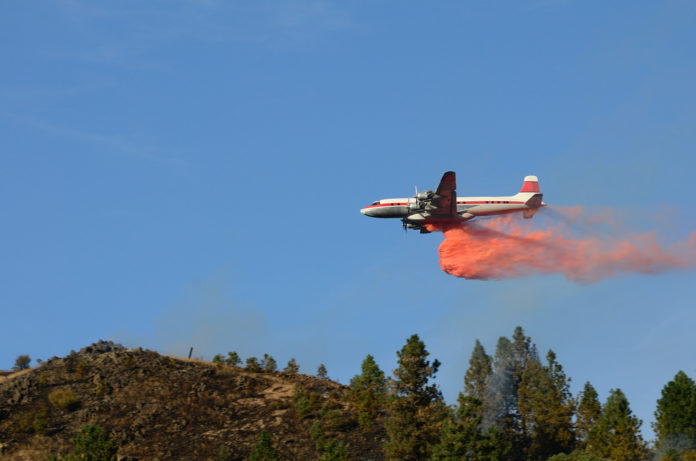Protest challenging agency’s price evaluation is denied. The solicitation sought air tankers to fight wildfires. The agency rejected the protester’s proposal because its overall cost for the tankers was higher than all the other offerors. The protester alleged the agency placed too much weight on overall cost, and that it should have also considered the protester’s low price for fire retardant. But the solicitation stated that the price evaluation would be based on overall cost. The court found the agency evaluated proposals consistent with the solicitation. Indeed, the court found that the protester’s argument was ultimately an untimely challenge to the solicitation’s price criteria.
The U.S. Forest Service issued a solicitation seeking to lease air tankers used to fight wildfires. The solicitation provided that the award would be based on a best-value tradeoff between technical factors and price with the technical factors and price given equal weight. The solicitation further stated that the Forest Service would evaluated overall price by combing the availability rate, the flight costs per hour, and fuel costs. The solicitation also noted that the agency would consider other price aspects, like price per gallon of fire retardant.
After reviewing several proposals, the Forest Service awarded contracts to three offerors: Erickson Aero Tanker, LLC, Aero-Flite, Inc., and Coulson Aviation. An unsuccessful offeror, 10 Tanker Air Carrier, LLC, filed a protest with GAO challenging the award. In response to the protest, the Forest Service took corrective to reevaluate proposals.
Following the reevaluation, the Forest Service once again awarded contracts to Erickson, Aero-Flite, and Coulson. The Forest Service rejected 10 Tanker’s proposal because it overall price was significantly higher than all the other offerors. The Forest Service did note that 10 Tanker’s price per gallon price of retardant was lower than others offerors’. But in the agency’s opinion, 10 Tanker’s high overall price negated any benefit obtained from its low retardant price.
10 Tanker filed a second protest with GAO. GAO denied the protest. 10 Tanker then filed suit with the Court of Federal Claims. Erickson and Aero-Flite intervened. All the parties moved for judgment on the administrative record.
10 Tanker contended the Forest Service was required to consider the price per gallon of retardant when evaluating price. Nevertheless, 10 Tanker argued, the agency failed to consider price per gallon and focused only on overall price, effectively disregarding 10 Tanker’s advantage in the best value tradeoff.
The court noted that while the solicitation provided that the Forest Service would consider price per gallon, it was clear that overall price was the most important aspect of price in the best value tradeoff. The court found that the Forest Service actually considered 10 Tanker’s price per gallon of retardant. The agency, however, explained that the low price per gallon was not particularly valuable in light of 10 Tanker’s high overall price. The court reasoned that the government had adhered to the solicitation and properly exercised is discretion in making the award decision.
10 Tanker asserted that the Forest Service improperly found its price to be outside the reasonable range of consideration. But the solicitation did not contain a price range; instead it left the decision to the agency’s discretionary balancing. The agency balanced the various price considerations reasonably finding that 10 Tanker’s overall price was the least advantageous despite the price per gallon of its flame retardant.
10 Tanker argued that the best-value determination was contrary to law. Both the Competition in Contracting Act and the FAR require that an agency’s primary concern is the “overall price the government will actually pay.” 10 Tanker alleged the Forest Service violated this principle by not considering what the government would actually pay in light of 10 Tanker’s low retardant price.
The court, however, reasoned that the Forest Service properly followed the solicitation’s formula in calculating the overall price and in giving overall price the most weight. The best-value determination was not contrary to law because it followed the terms of the solicitation. 10 Tanker was really objecting to the weight the Forest Service had applied to the price of retardant. This was ultimately a quibble with a discretionary judgment; it did not show the award was contrary to law.
10 Tanker alleged that award decision was based on a mistake of fact because when factoring in 10 Tanker’s low retardant cost, the government would not actually pay a price premium for 10 Tanker’s tankers. But the court reasoned that this argument was just another way of stating that the Forest Service should have afforded the price per gallon of retardant more weight, which the court had already rejected.
The court further noted that in addition to being meritless, 10 Tanker’s challenge to the price evaluation was really an untimely challenge to the terms of the solicitation. Under Blue & Gold Fleet, L.P. v. United States, 492 F.3d 1308 (Fed. Cir. 2007), a protester waives a challenge to an error in the solicitation when it fails to protest before the deadline for proposal. The court reasoned that by reading the terms of the solicitation, 10 Tanker should have known that overall cost was the most important factor in the price analysis. If 10 Tanker believed that the agency should have also considered the price of retardant, it should have filed a protest challenging the evaluation scheme before the proposal deadline.
Indeed, instead of challenging the solicitation, 10 Tanker submitted an alternate proposal that suggested the agency should make price per gallon of retardant the most important evaluation factor. This alternate proposal indicated that 10 Tanker knew that overall cost was the most important factor in the price evaluation. It could not now complain that the agency adhered to the terms of the solicitation in assessing price.
10 Tanker is represented by James G. Peyster and Thomas P. Humphrey of Crowell & Moring, LLP. Intervenor Aero-Flite is represented by Neil H. O’Donnell, Lucas T. Hanback, and Eleanor M. Ross of Rogers Joseph O’Donnell. Intervenor Erickson is represented by Jolyon A. Silversmith of KMA Zuckert, LLC and Rachel B. Trinder of Trinder Aviation & Aerospace Advocacy, PLLC. The government is represented Vijaya S. Surampudi, Brian M. Boynton, Martin F. Hockey Jr., and Tara K. Hogan of the Department of Justice as well as Antonio Robinson of the Department of Agriculture.





